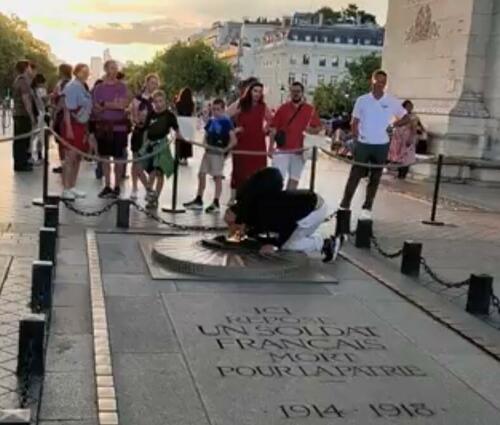AI Sentiment: Cautiously Bearish
Reason: The incident raises concerns about immigration policies and cultural respect, indicating potential challenges ahead for social integration in France.
In a surprising turn of events, the French government has decided to revoke the residency permit of a Moroccan man after an incident involving a cigarette lit on the tomb of the Unknown Soldier in Paris. This act, which took place at the Arc de Triomphe, sparked outrage and led to swift action by authorities.
The 32-year-old man was reported to have lit a cigarette on the revered site, which is a significant national memorial honoring the soldiers who died for France during World War I and subsequent conflicts. The act was not only seen as disrespectful but also as a violation of the values that the monument represents. Following this incident, the French authorities launched an investigation and subsequently announced the revocation of his residency status.
This decision underscores France's commitment to upholding its national values and the sanctity of its memorials. The minister responsible for citizenship expressed that such acts of disrespect would not be tolerated in the country, emphasizing the importance of honoring those who sacrificed their lives for the nation.
The Moroccan man, who has lived in France for several years, has expressed remorse over the incident; however, the government remains firm in its stance. This situation highlights the ongoing discussions surrounding immigration and the responsibilities that come with residency in France. It raises questions about cultural sensitivity and the expectations placed on individuals who choose to live in a country with a rich historical heritage.
As this case unfolds, it serves as a reminder of the delicate balance between cultural integration and respect for national symbols. The French government's decisive action reflects a broader sentiment about maintaining the integrity of its historical sites and the values they embody. The incident has resonated beyond France, prompting discussions on social media platforms about the responsibilities of immigrants and the significance of cultural respect.
This case may also lead to a more extensive review of immigration policies, particularly regarding how actions perceived as disrespectful can impact an individual's residency status. As nations grapple with the complexities of immigration, incidents like this will likely continue to provoke debate and reflection.
For those interested in the intersections of immigration, cultural respect, and national identity, this incident serves as a significant case study in the ongoing dialogue about what it means to be a resident in a country with a rich and complex history.




